 W
WAinu Revolution Theory is a left-wing political idea in Japan that was active in the 1970s. It was a variant of Proletarian Revolution Theory that came to light shortly after the revision of the Treaty of Mutual Cooperation and Security Between the United States and Japan, focusing on the Ainu. The actions and writings of Japanese left-wing thinker Ota Ryu in particular made Ainu Revolution Theory well known.
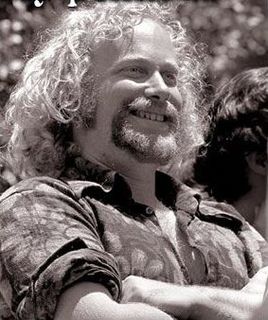 W
WStewart Edward "Stew" Albert was an early member of the Yippies, an anti-Vietnam War political activist, and an important figure in the New Left movement of the 1960s.
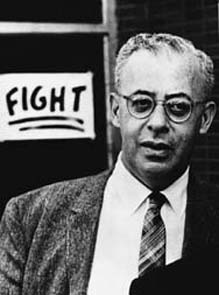 W
WSaul David Alinsky was an American community activist and political theorist. His work through the Chicago-based Industrial Areas Foundation helping poor communities organize to press demands upon landlords, politicians and business leaders won him national recognition and notoriety. Responding to the impatience of a New Left generation of activists in the 1960s, in his widely cited Rules for Radicals: A Pragmatic Primer (1971) Alinsky defended the arts both of confrontation and of compromise involved in community organizing as keys to the struggle for social justice.
 W
WThe Antonio Maceo Brigade was a political organization in the mid 1970s composed of Cuban Americans that demanded the right of Cuban exiles to travel to Cuba and to establish good relations with the Cuban government. The group was mainly composed of young Cuban Americans that had developed leftist sympathies from experiences in the civil rights movement and the anti-war movement, and were generally critical of anti-Castro rhetoric. The group was invited to Cuba personally by Fidel Castro. The visit brought a brief period of warmer Cuba-United States relations and brought attention to the Cuban-American left.
 W
WWilliam Charles Ayers is an American elementary education theorist. During the 1960s, Ayers was a leader of the Weather Underground militant group, described by the FBI as a terrorist group, that opposed US involvement in the Vietnam War. He is known for his 1960s radical activism and his later work in education reform, curriculum and instruction.
 W
WThe Berkeley Tribe was a radical counterculture weekly underground newspaper published in Berkeley, California from 1969 to 1972. It was formed after a bitter staff dispute with publisher Max Scherr and split the nationally known Berkeley Barb into new competing underground weeklies. In July 1969 some 40 editorial and production staff with the Barb went on strike for three weeks, then started publishing the Berkeley Tribe as a rival paper, after first printing an interim issue called Barb on Strike to discuss the strike issues with the readership. They incorporated as Red Mountain Tribe, named after Gallo's one gallon finger-ringed jug of cheap wine, Red Mountain. It became a leading publication of the New Left.
 W
WThe Black Liberation Army (BLA) was an underground Black Power revolutionary organization that operated in the United States from 1970 to 1981. Composed of Black Panthers (BPP) and Republic of New Afrika (RNA) members who served above ground before going underground, the organization's program was one of war against the United States government, and its stated goal was to "take up arms for the liberation and self-determination of black people in the United States." The BLA carried out a series of bombings, killings of police officers and drug dealers, robberies, and prison breaks.
 W
WThe Black Panther Party (BPP), originally the Black Panther Party for Self-Defense, was a Black Power political organization founded by college students Bobby Seale and Huey P. Newton in October 1966 in Oakland, California. The party was active in the United States between 1966 and 1982, with chapters in many major cities and international chapters in Britain and Algeria. Upon its inception the Black Panther Party's core practice was its open carry armed citizens' patrols ("copwatching") to monitor the behavior of officers of the Oakland Police Department and challenge police brutality in the city. From 1969 onwards, a variety of community social programs became a core activity. The Party instituted the Free Breakfast for Children Programs to address food injustice, and community health clinics for education and treatment of diseases including sickle cell anemia, tuberculosis, and later HIV/AIDS. It advocated for class struggle, with the party representing the proletarian vanguard.
 W
WAvram Noam Chomsky is an American linguist, philosopher, cognitive scientist, historian, social critic, and political activist. Sometimes called "the father of modern linguistics", Chomsky is also a major figure in analytic philosophy and one of the founders of the field of cognitive science. He is Laureate Professor of Linguistics at the University of Arizona and Institute Professor Emeritus at the Massachusetts Institute of Technology (MIT), and is the author of more than 150 books on topics such as linguistics, war, politics, and mass media. Ideologically, he aligns with anarcho-syndicalism and libertarian socialism.
 W
WSteven Conliff was a Midwestern-based Native American writer, historian, social satirist, alternative-media publisher and political activist in the 1960s and 1970s.
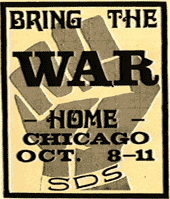 W
WThe Days of Rage demonstrations were a series of violent actions taken over a course of three days in October 1969 in Chicago, organized by the Weatherman faction of the counterculture-era group Students for a Democratic Society.
 W
WThe Democratic Socialist Organizing Committee was a democratic socialist organization in the United States.
 W
WDialectic of Enlightenment is a work of philosophy and social criticism written by Frankfurt School philosophers Max Horkheimer and Theodor W. Adorno. The text, published in 1947, is a revised version of what the authors originally had circulated among friends and colleagues in 1944 under the title of Philosophical Fragments.
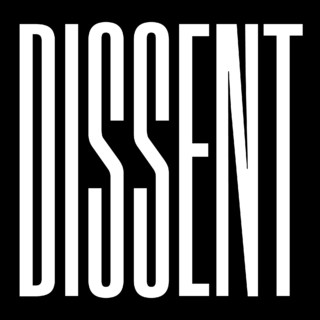 W
WDissent is a left-wing intellectual magazine edited by Natasha Lewis and Timothy Shenk and founded in 1954. The magazine is published by the University of Pennsylvania Press on behalf of the Foundation for the Study of Independent Social Ideas. Former co-editors include Irving Howe, Mitchell Cohen, Michael Walzer, and David Marcus.
 W
WBernardine Rae Dohrn is a retired law professor and a former leader of the radical Weather Underground in the United States. As a leader of the Weather Underground in the early 1970s, Dohrn was on the FBI's 10 Most Wanted list for several years. She remained a fugitive, even though she was removed from the list. After coming out of hiding in 1980, Dohrn pleaded guilty to misdemeanor charges of aggravated battery and bail jumping.
 W
WThe folk guerrilla concerts were folk music concerts in Shinjuku station, Shinjuku, Tokyo, held by anti-Vietnam War activists in 1969. The people who participated in the concert were termed folk guerrillas. The concerts were organized by the anti-war group Beheiren. They began in February, and concerts continued up until July, when a fight with riot police led to the dispersal of the concerts and the arrests of musicians.
 W
WThe Free Speech Movement (FSM) was a massive, long-lasting student protest which took place during the 1964–65 academic year on the campus of the University of California, Berkeley. The Movement was informally under the central leadership of Berkeley graduate student Mario Savio. Other student leaders include Jack Weinberg, Michael Rossman, George Barton, Brian Turner, Bettina Aptheker, Steve Weissman, Michael Teal, Art Goldberg, Jackie Goldberg and others.
 W
WThe West German student movement or sometimes called the 1968 movement in West Germany was a social movement that consisted of mass student protests in West Germany in 1968; participants in the movement would later come to be known as 68ers. The movement was characterized by the protesting students' rejection of traditionalism and of German political authority which included many former Nazi officials. Student unrest had started in 1967 when student Benno Ohnesorg was shot by a policeman during a protest against the visit of Mohammad Reza Pahlavi, the Shah of Iran. The movement is considered to have formally started after the attempted assassination of student activist leader Rudi Dutschke, which sparked various protests across West Germany. The movement would create lasting changes in German culture.
 W
WPaul Goodman (1911–1972) was an American author and public intellectual best known for his 1960s works of social criticism. Goodman was prolific across numerous literary genres and non-fiction topics, including the arts, civil rights, decentralization, democracy, education, media, politics, psychology, technology, urban planning, and war. As a humanist and self-styled man of letters, his works often addressed a common theme of the individual citizen's duties in the larger society, and the responsibility to exercise autonomy, act creatively, and realize one's own human nature.
 W
WThomas Emmet Hayden was an American social and political activist, author, and politician. Hayden was best known for his role as an anti-war, civil rights, and intellectual activist in the 1960s, authoring the Port Huron Statement and standing trial in the Chicago Seven case.
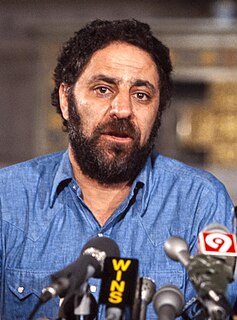 W
WAbbot Howard Hoffman, better known as Abbie Hoffman, was an American political and social activist who co-founded the Youth International Party ("Yippies") and was a member of the Chicago Seven. He was also a leading proponent of the Flower Power movement.
 W
WDavid Joel Horowitz is an American conservative writer. He is a founder and president of the think tank the David Horowitz Freedom Center (DHFC); editor of the Center's publication, FrontPage Magazine; and director of Discover the Networks, a website that tracks individuals and groups on the political Left. Horowitz also founded the organization Students for Academic Freedom.
 W
WThe International Socialist Organization (ISO) was a Trotskyist group active primarily on college campuses in the United States that was founded in 1976 and dissolved in 2019. The organization held Leninist positions on imperialism and the role of a vanguard party. However, it did not believe that necessary conditions for a revolutionary party in the United States were met; ISO believed that it was preparing the ground for such a party. The organization held a Trotskyist critique of nominally socialist states, which it considered class societies. In contrast, the organization advocated the tradition of "socialism from below." as articulated by Hal Draper. Initially founded as a section of the International Socialist Tendency (IST), it was strongly influenced by the perspectives of Draper and Tony Cliff. It broke from the IST in 2001, but continued to exist as an independent organization for the next eighteen years. The organization advocated independence from the U.S. two-party system and sometimes supported electoral strategies by outside parties, especially the Green Party of the United States.
 W
WGeorge Lester Jackson was an American author, activist, and convicted criminal. While serving a sentence for armed robbery in 1961, Jackson became involved in revolutionary activity and co-founded the Marxist–Leninist Black Guerrilla Family.
 W
WIn 1968 and 1969, there were student protests at several Japanese universities that ultimately forced the closure of campuses nationwide. Known as daigaku funsō or daigaku tōsō, the protests were part of the worldwide protest cycle in 1968 and the late-1960s Japanese protest cycle, including the Anpo protests of 1970 and the struggle against the construction of Narita Airport. Students initially demonstrated against practical issues in universities, and they eventually formed the Zenkyōtō in mid-1968 to organize themselves. The protests were dispersed in 1969 by the Act on Temporary Measures concerning University Management.
 W
WHerbert Marcuse was a German-American philosopher, sociologist, and political theorist, associated with the Frankfurt School of critical theory. Born in Berlin, Marcuse studied at the Humboldt University of Berlin and then at Freiburg, where he received his PhD. He was a prominent figure in the Frankfurt-based Institute for Social Research – what later became known as the Frankfurt School. He was married to Sophie Wertheim (1924–1951), Inge Neumann (1955–1973), and Erica Sherover (1976–1979). In his written works, he criticized capitalism, modern technology, Soviet Communism and entertainment culture, arguing that they represent new forms of social control.
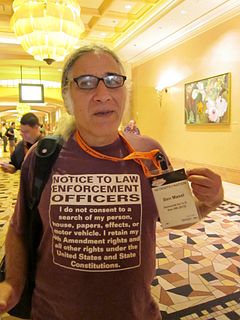 W
WBennett A. “Ben” Masel was an American writer, publisher, cannabis rights and free speech activist, expert witness for marijuana defendants, and frequent candidate for public office. A skilled chess player, Masel was director of Wisconsin NORML, and organizer of Weedstock and the annual Great Midwest Marijuana Harvest Festival which has been held in front of the Wisconsin State Capitol every autumn since 1971.
 W
WThe National Guardian, later known as The Guardian, was a left-wing independent weekly newspaper established in 1948 in New York City. The paper was founded by James Aronson, Cedric Belfrage and John T. McManus in connection with the 1948 Presidential campaign of Henry A. Wallace under the Progressive Party banner. Although independent and often critical of all political parties, the National Guardian is thought to have been initially close to the ideological orbit of the pro-Moscow Communist Party USA, but this suspected association quickly broke down in the course of several years.
 W
WThe Neo-Communist Party of the Soviet Union was a clandestine far-left group, which existed in the Soviet Union between September 1974 and January 1985. NCPSU is seen by modern researchers as one of the first organizations of the New Left in the USSR. However, Austrian researcher Hans Azenbaum, who studied the ideology of NCPSU, tends to view this party as the one focusing on the "third way", i.e. neither capitalism, nor real socialism.
 W
WNeo-Marxism is a Marxist school of thought encompassing 20th-century approaches that amend or extend Marxism and Marxist theory, typically by incorporating elements from other intellectual traditions such as critical theory, psychoanalysis, or existentialism.
 W
WThe New Left Review is a British bimonthly journal of ideas covering world politics, economy, and culture, which was established in 1960.
 W
WNext Left Notes (NLN) is an independent radical publication and weblog connected to the 2006 re-incarnation of Students for a Democratic Society (SDS). NLN began producing print versions in March 2008 - to mark its 4th anniversary.
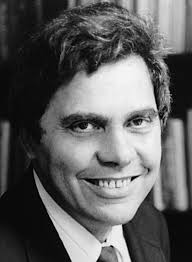 W
WNeil Postman was an American author, educator, media theorist and cultural critic, who eschewed technology, including personal computers in school and cruise control in cars, and is best known for twenty books regarding technology and education, including Amusing Ourselves to Death (1985), Conscientious Objections (1988), Technopoly: The Surrender of Culture to Technology (1992), The Disappearance of Childhood (1994), and The End of Education: Redefining the Value of School (1995).
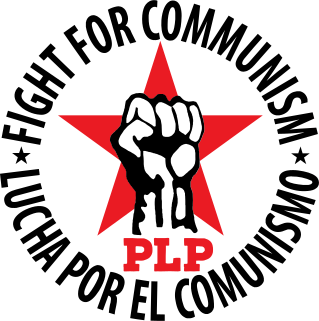 W
WThe Progressive Labor Party (PLP) is a Marxist–Leninist political party based primarily in the United States. The PLP is an anti-revisionist communist organization. It was established in January 1962 as the Progressive Labor Movement following a split in the Communist Party USA, adopting its new name at a convention held in the spring of 1965. It was involved in the anti-Vietnam War movement of the 1960s and early 1970s through its Worker Student Alliance faction of Students for a Democratic Society.
 W
WRadical America was a left-wing political magazine in the United States established in 1967. The magazine was founded by Paul Buhle and Mari Jo Buhle, activists in Students for a Democratic Society and served during its first few years of existence as an unofficial theoretical journal of that organization. During the 1970s and 1980s, the magazine changed to take on more of an academic Marxist flavor. With contributions from academics dwindling during the decade of the 1990s, the magazine was terminated in 1999.
 W
WIn the United States, the Revolutionary Youth Movement (RYM) was the section of Students for a Democratic Society (SDS) that opposed the Worker Student Alliance of the Progressive Labor Party (PLP). Most of the national leadership of SDS joined the RYM in order to oppose PLP's party line and what they alleged to be its attempted takeover of the SDS leadership structure, particularly at the 1969 SDS convention in Chicago.
 W
WJerry Clyde Rubin was an American social activist, anti-war leader, and counterculture icon during the 1960s and 1970s. During the 1980s, he became a successful businessman. He is known for being one of the co-founders of the Youth International Party (YIP), whose members were referred to as Yippies, and standing trial in the Chicago Seven case.
 W
WRobert George Seale is an American political activist and author.
 W
WBenjamin McLane Spock was an American pediatrician whose book Baby and Child Care (1946) is one of the best-selling volumes in history. The book's premise to mothers is that "you know more than you think you do."
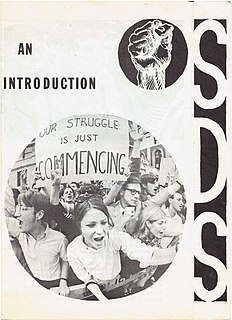 W
WStudents for a Democratic Society (SDS) was a national student activist organization in the United States during the 1960s, and was one of the principal representations of the New Left. Disdaining permanent leaders, hierarchical relationships and parliamentary procedure, the founders conceived of the organization as a broad exercise in "participatory democracy." From its launch in 1960 it grew rapidly in the course of the tumultuous decade with over 300 campus chapters and 30,000 supporters recorded nationwide by its last national convention in 1969. The organization splintered at that convention amidst rivalry between factions seeking to impose national leadership and direction, and disputing "revolutionary" positions on, among other issues, the Vietnam War and Black Power.
 W
WUp Against the Wall Motherfucker, often shortened as The Motherfuckers or UAW/MF, was a Dadaist and Situationist anarchist affinity group based in New York City. This "street gang with analysis" was famous for its Lower East Side direct action.
 W
WThe Weather Underground was a radical left wing militant organization first active in 1969, founded on the Ann Arbor campus of the University of Michigan. Originally known as the Weathermen, the group was organized as a faction of Students for a Democratic Society (SDS) national leadership. Officially known as the Weather Underground Organization (WUO) beginning in 1970, the group's express political goal was to create a revolutionary party to overthrow American imperialism.
 W
WErik Olin Wright was an American analytical Marxist sociologist and educator, specializing in social stratification and in egalitarian alternative futures to capitalism. He was known for diverging from classical Marxism in his breakdown of the working class into subgroups of diversely held power and therefore varying degrees of class consciousness. Wright introduced novel concepts to adapt to this change of perspective including deep democracy and interstitial revolution.
 W
WThe Youth International Party (YIP), whose members were commonly called Yippies, was an American youth-oriented radical and countercultural revolutionary offshoot of the free speech and anti-war movements of the late 1960s. It was founded on December 31, 1967. They employed theatrical gestures to mock the social status quo, such as advancing a pig as a candidate for president of the United States in 1968. They have been described as a highly theatrical, anti-authoritarian and anarchist youth movement of "symbolic politics".
 W
WThe All-Campus Joint Struggle Committees, commonly known as the Zenkyōtō, were Japanese student organizations consisting of anti-government, anti-Japanese Communist Party leftist and non-sectarian radicals. The Zenkyōtō were formed to organize students during the 1968–69 Japanese university protests. Unlike other student movement organizations, graduate students and young teachers were allowed to participate. Active in the late 1960s, Zenkyōtō was the driving force behind clashes between Japanese students and the police. Zenkyōtō groups were driven by alienation and a reaction to "American imperialism", Japanese "Monopoly Capitalism", and "Russian Stalinism". However, many members of the movement were non-political, and were focused more on more practical and local problems. Much of the movement centered around nihilism, humanism and existentialism, which served as inspirations for revolution.